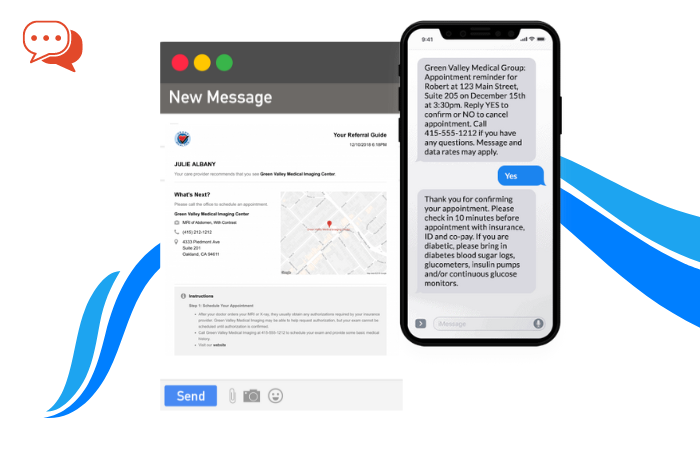Imagine having a VIP pass to a concert and then security telling you that you’re not allowed to go backstage. Such a pass wouldn’t seem very appealing as its worth is entirely contingent upon its ability to produce unrestricted access. Limited access holds limited power and limited value.
In a medical office, the doctors are the rock stars. Patients recognize the value of a doctor that makes themselves available after-hours. Similarly, a doctor should see equal value in a system that makes access to their patient files as easy as possible.
While doctors would hope that their days end at the time noted on their entrance way, the nature of their profession means that it is not uncommon for their services to be called upon at odd hours. In fortunate cases, issues can be resolved over the phone, but those instances that require a doctor to send a patient file to another physician, for many, still means making the commute to retrieve physical files from an office building.
Time is wasted. Stress is added. Sleep is lost. A doctor relying upon a system that places restrictions upon their ability to retrieve and transmit their patient files seems about as logical as a concert headliner specifically requesting that his road crew hide his guitar right before a big show. Adding unnecessary hurdles to a physician’s regimen is not only pointless; it takes away from their family, their patients, and their wallet.
It is understood that becoming a doctor is not simply a decision; it’s a calling that demands a great deal. Time away from family and friends is one of the biggest sacrifices. On a website directed towards those considering practicing medicine as a profession, Dr. Kevin Pezzi notes, “Twenty hours of paid time may translate into 30-plus hours carved from your personal life.
You might try to work fewer paid hours, but doing so makes it difficult to economically rationalize why you assumed so many student loans to become a doctor.” It’s even harder for women, who can be vilified for choosing to work fewer hours in favor of a more balanced work-life.
In a New York Times op-ed, piece anesthesiologist Karen S. Sibert voices her criticism of doctors unwilling to make full sacrifice of their time, stating that “It’s fine if journalists or chefs or lawyers choose to work part time or quit their jobs altogether. But it’s different for doctors. Someone needs to take care of the patients.” When time becomes as limited as it is in the medical field, every minute away from the office is cherished, as doctors struggle to maintain optimal patient care without neglecting time spent with loved ones.
Striking such a balance is not easy as asking a doctor to leave their work at the office is simply not a reasonable request for many physicians. The goal, then, becomes making office-related work more readily available at home, limiting the retrieval and handling process.
Personal Sacrifice
In addition to taking doctors away from their personal lives, a doctor’s inability to quickly retrieve patient information is detrimental to their level of patient care provided. Here, time becomes a factor in medical response. It would not be unheard of for a physician to make an emergency request for a patient’s file from another physician. What happens when the doctor is away from the office and there is no one else that can access the file?
According to the U.S. Census Bureau, the average time spent commuting to work is 24.3 minutes. 24.3 minutes is a lifetime and can mean the difference between life and death when dealing with an emergency situation. This scenario doesn’t even begin to take into account the additional time spent searching for the proper paperwork, which can take longer than expected, particularly in situations where doctors are unfamiliar with their own filing system, their demanding schedule forcing them to delegate such organization to staff members (that are nowhere to be found).
Accounting for the number of deaths that occur when care is not given in time, a physician’s ability to produce patient records shouldn’t be discussed in terms of minutes; it should be discussed in terms of seconds.
Being an effective doctor is not just a matter of providing excellent patient care, but doing so while managing a life outside of work. A doctor is always on duty. This, of course, means that it is necessary for them to have to proper resources at their disposal at all times. In considering making a shift within the office, opting to minimize dependence upon filing of physical paperwork in favor of electronic records, questions pertaining to cost are the most prevalent.
Answering these concerns is best addressed by recognizing the amount of money being lost in adhering to an undependable system. When evaluating the system already in place, consider the following:
- How much money and time is being wasted, hiring staff to manage paperwork?
- Are you wasting money on gas and time spent in traffic, having to make additional trips to the office?
- What’s the potential cost of not being able to provide patient information when time becomes a critical issue?
The sacrifices that doctors make are made for a reason. The countless hours of education and debt incurred through years spent in medical school should come with an expectation that not only is it worth it, but that time served is rewarded with an increased ability to instill greater flexibility into one’s work schedule. You are the rock-star and you have paid your dues.
Are you a VIP?
Don’t you deserve an all-access pass to your own office? Yes. After all, if you can easily access your personal email and social networking profiles on a computer or cell phone at work, shouldn’t it be just as easy to access patient files at home? Yes. Should it cost you an arm and a leg? No! And, you know what? It doesn’t have to.
Works Cited
Belkin, Lisa. “Should Women Be Doctors? – NYTimes.com.” Parenting, Children and Parents – Motherlode Blog – NYTimes.com. 13 June 2011. Web. 27 Sept. 2011. <http://parenting.blogs.nytimes.com/2011/06/13/should-women-be-doctors/>.
“Does Becoming a Doctor Mean Sacrificing a Family?” ACP Internist. 29 June 2011. Web. 27 Sept. 2011. <http://blog.acpinternist.org/2011/06/does-becoming-doctor-mean-sacrificing.html>.
Longley, Robert. “Americans Now Spend Over 100 Hours a Year Commuting.” U.S. Government Info – Resources. Web. 27 Sept. 2011. <http://usgovinfo.about.com/od/censusandstatistics/a/commutetimes.htm>
Pezzi, Kevin. “Can She Be a Mother AND a Doctor?” ER-doctor.com: Information for People Contemplating a Career in Emergency Medicine and Other Specialties. Web. 27 Sept. 2011. <http://www.er-doctor.com/women_as_doctors8.html>.











